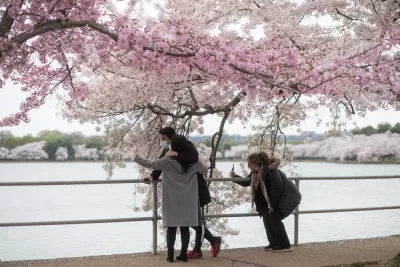The Trust for Public Land has published the most recent version of its annual ranking of parks and open space. A new twist for 2021includes a new metric to consider equity.

The Trust for Public Land this week published the 2021 ParkScore Index, ranking Washington, D.C. at the top of the list that compares park systems in the 100 most populated cities in the United States.
The ParkScore Index measures park systems across five categories: access, investment, amenities, acreage, and—new for 2021—equity.
"Beyond the ranking of 100 cities, the data behind the ParkScore index also reveals park access levels for nearly every city and town in the United States," according to the Trust for Public Land's website for the 2021 ParkScore Index. The tool is designed to provide communities with information to help close the park equity gap, according to the Trust for Public Land.
Following D.C. in this year's top five on the index are 2) St. Paul, Minnesota; 3) Minneapolis, Minnesota; 4) Arlington, Virginia; and 5) Chicago, Illinois.
Minneapolis topped the 2020 list. Local news coverage in Cincinnati examined that city's fall from fifth to eighth on the list.
FULL STORY: 2021 ParkScore Index

Maui's Vacation Rental Debate Turns Ugly
Verbal attacks, misinformation campaigns and fistfights plague a high-stakes debate to convert thousands of vacation rentals into long-term housing.

Planetizen Federal Action Tracker
A weekly monitor of how Trump’s orders and actions are impacting planners and planning in America.

Chicago’s Ghost Rails
Just beneath the surface of the modern city lie the remnants of its expansive early 20th-century streetcar system.

Bend, Oregon Zoning Reforms Prioritize Small-Scale Housing
The city altered its zoning code to allow multi-family housing and eliminated parking mandates citywide.

Amtrak Cutting Jobs, Funding to High-Speed Rail
The agency plans to cut 10 percent of its workforce and has confirmed it will not fund new high-speed rail projects.

LA Denies Basic Services to Unhoused Residents
The city has repeatedly failed to respond to requests for trash pickup at encampment sites, and eliminated a program that provided mobile showers and toilets.
Urban Design for Planners 1: Software Tools
This six-course series explores essential urban design concepts using open source software and equips planners with the tools they need to participate fully in the urban design process.
Planning for Universal Design
Learn the tools for implementing Universal Design in planning regulations.
planning NEXT
Appalachian Highlands Housing Partners
Mpact (founded as Rail~Volution)
City of Camden Redevelopment Agency
City of Astoria
City of Portland
City of Laramie





























